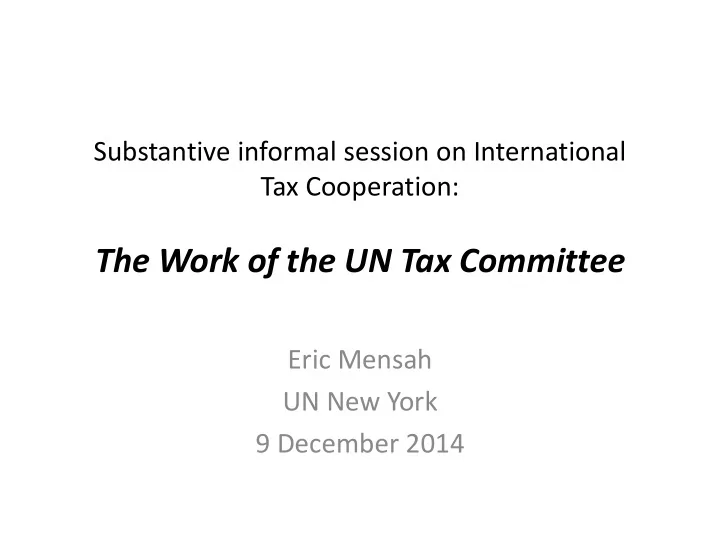

Substantive informal session on International Tax Cooperation: The Work of the UN Tax Committee Eric Mensah UN New York 9 December 2014
Committee of Experts on International Cooperation in Tax Matters • ECOSOC Resolution 2004/69 established the UN Committee – 25 members nominated by governments but acting in their personal capacity. – Selection based on equitable geographical distribution representing different tax systems. – Appointed by UN Secretary General, after notification to ECOSOC. – http://www.un.org/esa/ffd/topics/tax ‐ cooperation.html 2
UN Committee • Term of office: 4 years – Current Committee: June 2013 – June 2017. • Meeting: once a year in Switzerland/Geneva for 5 days (open to public after registration). • Subcommittee system for inter ‐ sessional work – (governments, business, advisers, academics, and NGOs). • Very small secretariat based in UN New York. 3
UN Committee 4
Example of work: UN Model Countries tax on both a source and a residence basis in their domestic law: double tax treaties seek to avoid double taxation that are the result of overlapping taxing rights. Developing Developed Country Country Taxing Rights Taxing Rights Scope of Scope of domestic domestic tax law tax law (Country of (Country of Investment) Residence of Investor) 5
Example of work: UN Model • Double taxation can be avoided in many ways of balancing source and residence country taxing rights but the impact on domestic resource mobilization will differ accordingly. • The real question in most tax treaty negotiations is how much of its domestic law taxing rights will the source country give up (effectively allowing more taxing rights to the residence country, which may not be exercised in practice)? • OECD countries tend to be net capital exporters and the OECD Model Tax Convention generally favours the “residence country” of traders and investors. • UN Model (more for capital importers) favours more retention of “source country” taxing rights – where the trade or investment occurs. 6
Example of work: UN Model • Multinationals generally have most interest in reduced withholding taxes (WHT) on dividends, royalties and interest flows. • UN work recognizes WHTs as an important source of development revenue for countries , however, and harder to plan around for tax avoidance purposes than reliance upon the often disputed issue of where “profit is made”. • WHTs is an issue (like the general issue of source vs. residence country taxation) that is not part of the OECD/G20 BEPS Action Plan but is important to developing countries – needs to be discussed and an accommodation reached. 7
Example of work: UN Model • UN Model treats services provision as different to goods provision. • A lower level of economic engagement is required before source country taxation is allowed under a tax treaty. Less demand for “bricks and mortar” presence to show the necessary level of economic engagement (called a “permanent establishment”). • New UN Model in 2017 will continue this trend of responding to developing country priorities by preserving source country taxing rights in a service based economy – new Fees for Technical Services Article. 8
Example of work: UN Model • UN countries are more divided on mandatory binding arbitration for resolving tax disputes between countries. • Provisions with and without arbitration – a difference to the OECD Model. • Reflects many countries experience of the cost and doubts about the fairness to them of arbitration, with a background of investment arbitration concerns. • UN Secretariat paper on issues for developing countries and ways forward in 2015. 9
Example of work: Transfer Pricing Manual • UN Practical Manual on Transfer Pricing for Developing Countries. • Practical guidance to avoid and address profit shifting , while giving reasonable certainty to business. • Emphasis on practicality and “administrability” in developing countries. • Next version responds to developing country concerns by addressing key issues such as valuing intangibles and services provided within multinational groups. Both widely used for shifting profits. 10
Example of work: Extractive Industry Taxation • Subcommittee brings together experts from tax authorities, international organizations, private sector, advisers, academics and NGOs. • Responds to developing country concerns that the extractive industries are not delivering the tax and development results they should (e.g. Africa Progress Panel reports). 11
Example of work: Extractive Industry Taxation • Currently working on guidance notes on: – Capital gains taxation incl. overseas “indirect sales” ( concern in developing countries about offshore sales of mines etc. to avoid taxes). – Value added taxation issues. – Tax treatment of decommissioning of extractive facilities – ensuring clean ‐ up happens at the end of a facility’s life – i.e. that money exists to achieve that. – Tax treaty issues. • Further work will include fiscal issues in contract negotiations. 12
Example of work: Extractive Industry Taxation Visit to Kloof Goldmine at the first Subcommittee Meeting in South Africa 13
UN Committee: Resourcing • Work of Subcommittees is central to responding to developing country needs and priorities but is not funded , resulting in – Limited number of face ‐ to ‐ face meetings (necessary for the hardest issues). – Underrepresentation of developing countries (even if they are Subcommittee members – often can’t attend). – Insufficient participation of Committee members and possibly proportional over ‐ representation of business sector (easier to finance participation). – Inability of the Secretariat to fully support such meetings including through research, expert papers, attendance and drafting proposals. 14
Final Thoughts • Developing country roles in international norm discussion and creation. • How the UN Tax Committee can play its part in improving the situation. 15
Recommend
More recommend